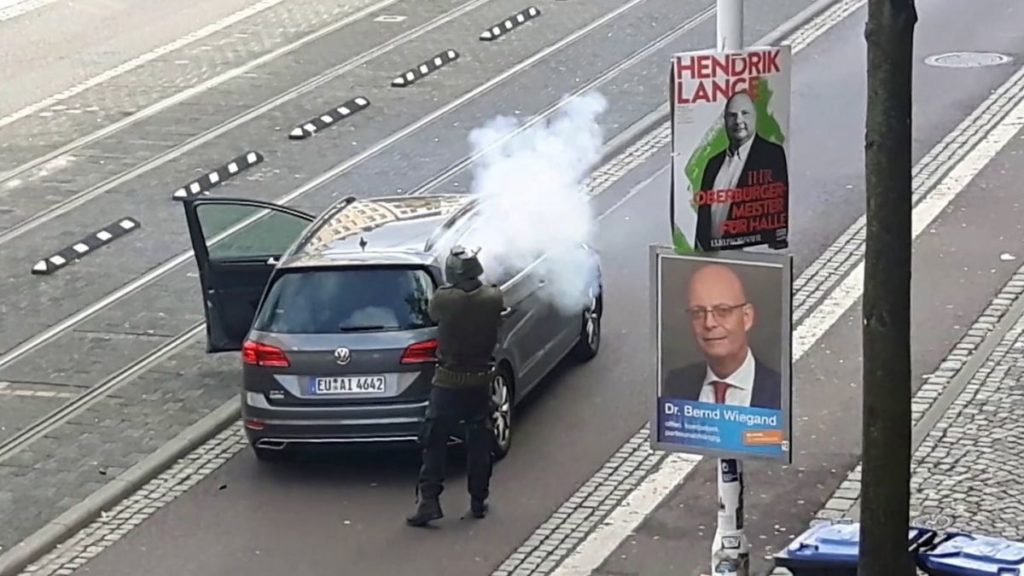Australia/Israel Review
Europa Europa: Halle and Antisemitism in Germany
Nov 8, 2019 | American Jewish Committee

As worshipers inside the Humboldt Street Synagogue in the eastern German city of Halle focused their prayers on forgiveness and repentance on October 9, the assailant outside aimed a camera and his gun. He live-streamed his anti-Jewish diatribes. He broadcast his attempts to blow up and break down the locked door of the synagogue. He recorded the man he shot at point-blank range and the lifeless body of a woman he shot in the back.
While millions of Jews around the world observed Yom Kippur, their most solemn and holy day, 2,200 people watched the 35-minute video of murder and mayhem before the streaming site, Twitch, finally took it down.
The horrific attack on a German synagogue was the second in less than a week – a lethal turn of events that has seemed inevitable as antisemitic crimes have risen in recent years.
“Everyone is devastated and frightened and expressing shock,” said Remko Leemhuis, acting Director of the American Jewish Committee’s (AJC) Berlin Ramer Institute. “The guy isn’t a lone wolf. He’s an expression of the climate in our society.”
Here are three things you need to know to understand antisemitism in Germany and the context of the Yom Kippur killing spree:
1. ‘A new level of antisemitic crime’
A report on politically motivated crimes recently released by the German Interior Ministry showed that antisemitic incidents rose from 1,504 complaints in 2017 to 1,799 cases last year, an increase of 19.6%. The main offences included hate speech, antisemitic graffiti and displaying banned signs such as the swastika.
But violent crimes against Jews have escalated too. On Friday, Oct. 4, security guards stopped a Syrian refugee wielding a knife who had gotten past the security barrier of a Berlin synagogue, uttering “Allahu akbar” (“God is Great” in Arabic).
In August 2018, during right-wing riots in protest over a German man’s stabbing by immigrants, a gang of neo-Nazis raided a kosher cafe in the city of Chemnitz. Masked men hurled stones and bottles, breaking windows and shouting, “Get out of Germany, you Jewish pig.”
Felix Klein, the German Government’s Commissioner for Antisemitism, said at the time: “We are dealing with a new level of antisemitic crime. It calls to mind the worst memories of the 1930s.” Months later, as attacks continued, he warned Jewish men not to wear their yarmulkes in public.
After fierce backlash, Chancellor Angela Merkel’s spokesman countered that “the state has to ensure that the free exercise of religion is possible for everyone.”
2. ‘Everyone has to know they play a role’
Scholars have traced the recent uptick of antisemitism in Europe to three sources. As conflicts in Iraq and Syria and other factors create the worst refugee crisis in recent history, Germany has opened its doors to accept up to a million refugees. Those on the far-right end of the political spectrum, including the Alternative for Germany (AfD) party, foment xenophobia and blame Jews for empowering immigrants and minorities and wrecking white European civilisation.
Masked in the language of human rights, activists on the far-left call themselves “anti-Zionists.” But rather than present legitimate criticism of Israel’s policies, they question the very existence of the Jewish state, a position generally regarded as antisemitic.
Meanwhile, extremist ideologies propagated in the name of Islam and peddled by global terror networks such as Hezbollah fuel a third source of anti-Jew hatred.
But Leemhuis said that in Germany, while the left blames the right and the right blames the left, there is a subtle strain emerging from the centre. “We really have to confront this,“ Leemhuis said. “Everyone has to know they play a role… And words matter.”
Leemhuis pointed to a recent story in the otherwise reputable German magazine Spiegel that portrayed a small Jewish association as steering German foreign policy in the Middle East.
“Just the fact that six editors worked on this piece and nobody ever said, ‘What are we publishing? This could lead to some very dark ideas’… This is an alarming signal.”
He continued: “When politicians and officials come out and say antisemitism has no place in our society, I think: ‘Antisemitism obviously has a place in our society.’”
3. ‘Lives of Jews can not depend on how thick the door is’
Following Klein’s controversial comments, Chancellor Angela Merkel told CNN that the spectre of antisemitism has never departed Germany.
“There is to this day not a single synagogue, not a single daycare centre for Jewish children, not a single school for Jewish children that does not need to be guarded by German policemen,” she said.
But on Yom Kippur, there were no security guards posted outside the Halle synagogue.
“The safety and the lives of Jews cannot depend on how thick the door is,“ AJC’s Leemhuis said.
Furthermore, the German Government refuses to designate Hezbollah, a major trafficker of antisemitism on European soil, as a terrorist organisation in its entirety.
Tags: Antisemitism, Europe, Terrorism






